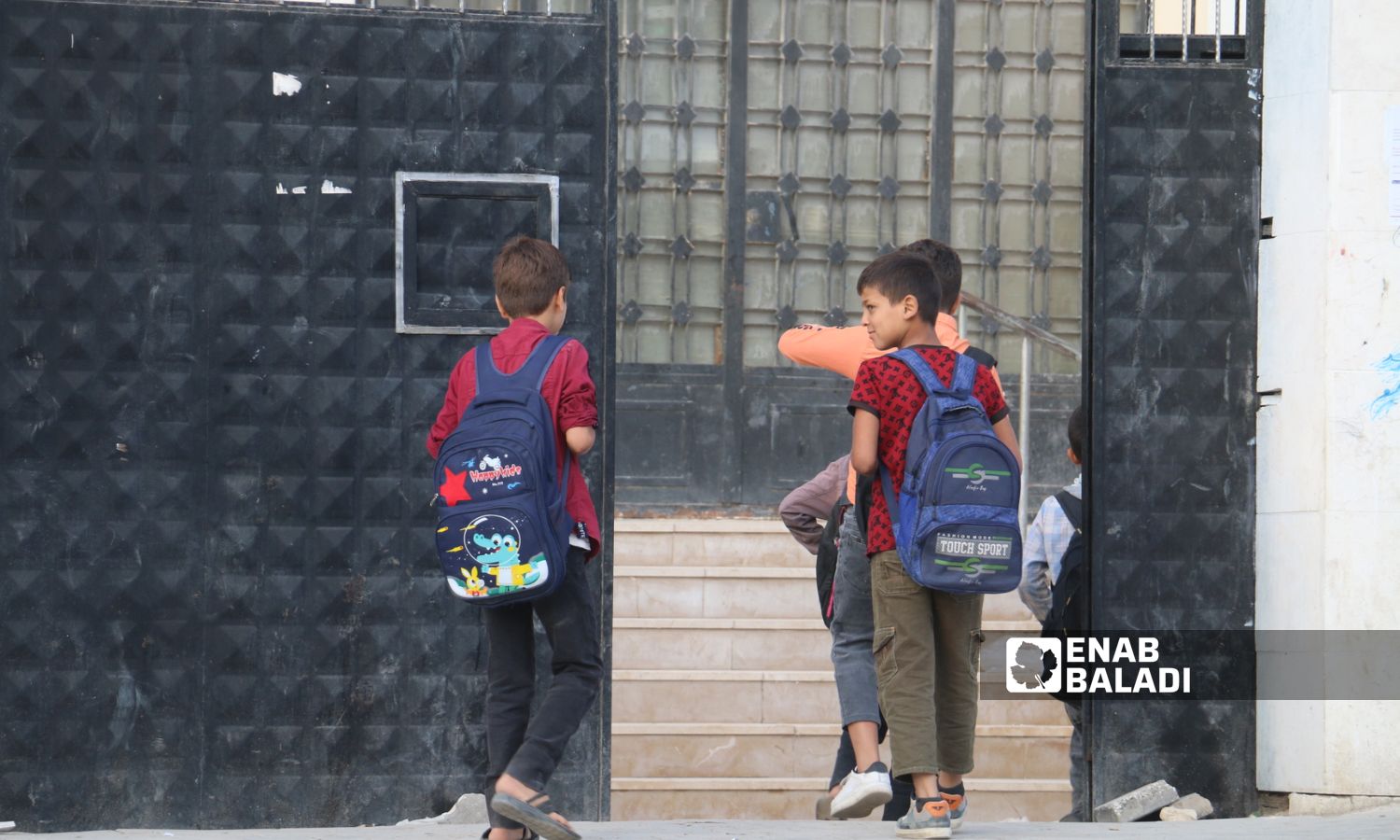



Azaz – Dayan Junpaz
Areas under the control of the Syrian Interim Government (SIG) in northern and eastern rural Aleppo have been witnessing the resignation of teachers from public schools for several reasons, primarily in search of a salary that meets family needs.
Since 2023 until the end of last February, more than 500 teachers have resigned, according to statistics obtained by Enab Baladi from the head of the teachers’ union in Azaz city, northern rural Aleppo, Mohammad Sabah Hamidi.
The resignations hiked after teachers repeatedly demanded salary increases and improvement of the educational process at the beginning of each school term, refusing to accept any partial or temporary solutions like food baskets or clothing vouchers, as some teachers considered them insufficient to meet their demands.
A single teacher receives 1,750 Turkish lira (about 56 US dollars), and a married teacher gets 1,925 lira (about 62 US dollars), while the recognized poverty line has reached 10,843 lira, and the extreme poverty threshold is at 8,933 lira.
The head of the teachers’ union in Azaz city, Mohammad Sabah Hamidi, told Enab Baladi that the rise in material prices and the decline in teachers’ salaries have had negative effects on education, resulting in a large number of resignations.
He added that the absence of a real educational reference and a fair salary scale has led more than 500 teachers from the northern and eastern rural Aleppo areas to resign, causing a catastrophe for the educational process due to the lack of staff and the unavailability of competent individuals to meet urgent needs.
Hamidi mentioned that teachers no longer address their demands to local authorities or education directorates, but rather direct their message towards the Turkish government, as they consider that solutions lie in the hands of Turkish coordinators, not local entities.
Former math teacher at Soran secondary school in eastern Azaz city, Hussein Khalaf, told Enab Baladi that his decision to resign was primarily due to the weakness of the financial grant provided to teachers, which ranged between 70 and 90 US dollars.
The teacher added that another reason is the vagueness of the decisions issued regarding examinations, noting that math exam questions are often set by the education directorates without considering the situation of the students or the school, despite the subject being a specialty.
For his part, Mustafa Karkaj, a former teacher at Abdullah Rajab high school in Azaz city, said that a series of issues accumulated that pushed him to resign, most notably the weakness of the financial grant provided by the Turkish government, in addition to its receipt in Turkish currency and the rise in most commodity prices.
Karkaj told Enab Baladi that there is a weakness in the examination system, an increase in the number of teacher periods and neglect of schools, and a failure to provide books and necessities of the educational process.
Teachers made multiple attempts to find solutions and met with the relevant parties, but without reaching a satisfactory solution, according to teachers who spoke to Enab Baladi.
Following their resignations, both Mustafa Karkaj and Hussein Khalaf turned to private schools, which is the case for most resignees, mentioning that the teaching process is more “facilitated” compared to public schools, with improvements and flexibility in decision-making and freedom in practicing the profession.
Teacher Hussein Khalaf said that making the decision to resign was not easy, but he was forced to leave the public schools and the students he had known for 15 years after losing hope for another solution.
Karkaj, on the other hand, told Enab Baladi that the impact of his resignation on his personal life appeared in the difference between the salary system in public versus private schools; in public schools, the salary remains constant whether during holidays or school periods throughout the year.
He mentioned that the salary in private schools is not provided during the holiday period but is focused only on the actual school term.
The teacher’s monthly salary ranges from 150 to 250 US dollars, depending on the stage taught and the period of study, with a teacher receiving 250 dollars if teaching in both the morning and evening shifts. If he has classes only in the morning, the salary can be between 125 and 150 dollars.
The resignation of teachers from public schools bears negative effects on the educational process as a whole, and teachers who spoke to Enab Baladi warned of the danger that may threaten thousands of students due to the lack of staff and from public schools turning private.
Teacher Mohammad Nour at Badr al-Kubra school in Azaz said to Enab Baladi that thinking about living concerns, sustenance, family needs, and not receiving a sufficient salary might affect the teacher’s own explanation of educational materials.
He pointed out that public schools lack preparedness, amidst an absence of laboratories and specialized teachers in English and Turkish languages, and other subjects like sports and music.
Strikes, protests, and demonstrations organized by teachers in northern and eastern rural Aleppo have been frequent, despite varying reasons, such as demands for increased monthly income, protection of teachers’ rights, demonstrations against administrative corruption in the region, and the deterioration of the educational process.
Despite ongoing demands for over two years in areas controlled by the Interim Government, problems still exist to this day.
Northwestern Syria is suffering from economic malaise, which has negatively reflected on all aspects of life.
The most recent raise for teachers’ salaries in areas under the Interim Government control occurred in December 2022 and amounted to 75%, but that has not stopped the protests and demands.
The living and economic situation of teachers is similar in most areas of northern Syria, where the UN Coordination Office estimated that nearly a quarter of the teachers in Idlib do not receive salaries, with their number reaching 2,380 out of 10,853, according to a report in October 2023.
if you think the article contain wrong information or you have additional details Send Correction